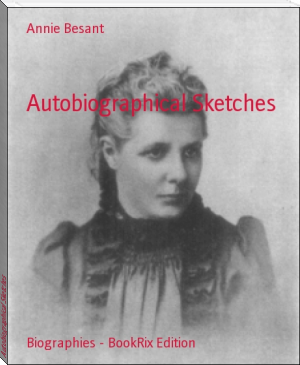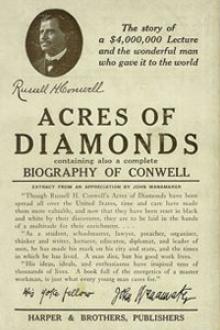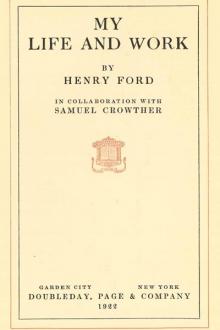Annie Besant - Annie Besant (free e reader .txt) 📗

- Author: Annie Besant
Book online «Annie Besant - Annie Besant (free e reader .txt) 📗». Author Annie Besant
The name was suggested by the famous statue of
"Ajax Crying for Light," a cast of which may be seen
in the centre walk by any visitor to the Crystal Palace,
Sydenham. The cry through the darkness for light,
even though light should bring destruction, was one
that awoke the keenest sympathy of response from my
heart:
"If our fate be death Give light, and let us die!"
To see, to know, to understand, even though the seeing blind, though the knowledge sadden, though the understanding shatter the dearest hopes--such has ever been the craving of the upward-striving mind in man. Some regard it as a weakness, as a folly, but I am sure that it exists most strongly in some of the noblest of our race; that from the lips of those who have done most in lifting the burden of ignorance from the overstrained and bowed shoulders of a stumbling world has gone out most often into the empty darkness the pleading, impassioned cry:
"Give light!"
The light may come with a blinding flash, but it is light none the less, and we can see.
And now the time had come when I was to use that gift of speech which I had discovered in Sibsey Church that I possessed, and to use it to move hearts and brains all over the English land. In 1874, tentatively, and in 1875 definitely, I took up this keen weapon, and have used it ever since. My first attempt was at a garden party, in a brief informal debate, and I found that words came readily and smoothly: the second in a discussion at the Liberal Social Union on the opening of museums and art galleries on Sunday. My first lecture was given at the Co-operative Institute, 55, Castle Street, Oxford Street, on August 25, 1874. Mr. Greening--then, I think, the secretary--had invited me to read a paper before the society, and had left me the choice of the subject. I resolved that my first public lecture should be on behalf of my own sex, so I selected for my theme, "The Political Status of Women," and wrote thereon a paper. But it was a very nervous person who presented herself at the Co-operative Institute on that August evening. When a visit to the dentist is made, and one stands on the steps outside, desiring to run away ere the neat little boy in buttons opens the door and beams on one with a smile of compassionate superiority and implike triumph, then the world seems dark and life is as a huge blunder. But all such feelings are poor and weak as compared with the sinking of the heart and the trembling of the knees which seize upon the unhappy lecturer as he advances towards his first audience, and as before his eyes rises a ghastly vision of a tongue-tied would-be lecturer, facing rows of listening faces, listening to--silence. But to my surprise all this miserable feeling vanished the moment I was on my feet and was looking at the faces before me. I felt no tremor of nervousness from the first word to the last, and as I heard my own voice ring out over the attentive listeners I was conscious of power and of pleasure, not of fear. And from that day to this my experience has been the same; before a lecture I am horribly nervous, wishing myself at the ends of the earth, heart beating violently, and sometimes overcome by deadly sickness. Once on my feet, I feel perfectly at my ease, ruler of the crowd, master of myself. I often jeer at myself mentally as I feel myself throbbing and fearful, knowing that when I stand up I shall be all right, and yet I cannot conquer the physical terror and trembling, illusory as I know them to be. People often say to me, "You look too ill to go on the platform." And I smile feebly and say I am all right, and I often fancy that the more miserably nervous I am in the ante-room, the better I speak when once on the platform. My second lecture was delivered on September 27th, at Mr. Moncure D. Conway's Chapel, in St. Paul's Road, Camden Town, and redelivered a few weeks later at a Unitarian Chapel, where the Rev. Peter Dean was minister. This was on the "True Basis of Morality," and was later printed as a pamphlet, which attained a wide circulation. This was all I did in the way of speaking in 1874, but I took silent part in an electioneering struggle at Northampton, where a seat for the House of Commons had fallen vacant by the death of Mr. Charles Gilpin. Mr. Bradlaugh had contested the borough as a Radical in 1868, obtaining 1,086 votes, and again in February, 1874, when he received 1,653; of these no less than 1,060 were plumpers, while his four opponents had only 113, 64, 21 and 12 plumpers respectively; this band formed the compact and personally loyal following which was to win the seat for its chief in 1880, after twelve years of steady struggle, and to return him over and over again to Parliament during the long contest which followed his election, and which ended in his final triumph. They never wavered in their allegiance to "our Charlie," but stood by him through evil report and good report, when he was outcast as when he was triumphant, loving him with a deep, passionate devotion, as honourable to them as it was precious to him. I have seen him cry like a child at evidences of their love for him, he whose courage no danger could daunt, and who was never seen to blench before hatred nor change his stern immobility in the face of his foes. Iron to enmity, he was soft as a woman to kindness; unbending as steel to pressure, he was ductile as wax to love. John Stuart Mill had the insight in 1868 to see his value, and the courage to recognise it. He strongly supported his candidature, and sent a donation to his election expenses. In his "Autobiography" he wrote (pp. 311, 312):--
"He had the support of the working classes; having heard him speak I knew him to be a man of ability, and he had proved that he was the reverse of a demagogue by placing himself in strong opposition to the prevailing opinion of the Democratic party on two such important subjects as Malthusianism and Proportional Representation. Men of this sort, who, while sharing the democratic feeling of the working classes, judge political questions for themselves, and have the courage to assert their individual convictions against popular opposition, were needed, as it seemed to me, in Parliament; and I did not think that Mr. Bradlaugh's anti-religious opinions (even though he had been intemperate in the expression of them) ought to exclude him."
It has been said that Mr. Mill's support of Mr. Bradlaugh's candidature at Northampton cost him his own seat at Westminster, and so bitter was bigotry at that time that the statement is very likely to be true. On this, Mr. Mill himself said: "It was the right thing to do, and if the election were yet to take place, I would do it again."
At this election of September, 1874--the second in the year, for the general election had taken place in the February, and Mr. Bradlaugh had been put up and defeated during his absence in America--I went down to Northampton to report electioneering incidents for the _National Reformer_, and spent some days there in the whirl of the struggle. The Whig party was more bitter against Mr. Bradlaugh than was the Tory. Strenuous efforts were made to procure a Liberal candidate, who would be able at least to prevent Mr. Bradlaugh's return, and, by dividing the Liberal and Radical party, should let in a Tory rather than the detested Radical. Messrs. Bell and James and Dr. Pearce came on the scene only to disappear. Mr. Jacob Bright and Mr. Arnold Morley were vainly suggested. Mr. Ayrton's name was whispered. Major Lumley was recommended by Mr. Bernal Osborne. Dr. Kenealy proclaimed himself ready to come to the rescue of the Whigs. Mr. Tillett, of Norwich, Mr. Cox, of Belper, were invited, but neither would consent to oppose a good Radical who had fought two elections at Northampton and had been the chosen of the Radical workers for six years. At last Mr. William Fowler, a banker, accepted the task of handing over the representation of a Liberal and Radical borough to a Tory, and duly succeeded in giving the seat to Mr. Mereweather, a very reputable Tory lawyer. Mr. Bradlaugh polled 1,766, thus adding another 133 voters to those who had polled for him in the previous February.
That election gave me my first experience of anything in the nature of rioting. The violent abuse levelled against Mr. Bradlaugh by the Whigs, and the foul and wicked slanders circulated against him, assailing his private life and family relations, had angered almost to madness those who knew and loved him; and when it was found that the unscrupulous Whig devices had triumphed, had turned the election against him, and given over the borough to a Tory, the fury broke out into open violence. One illustration may be given as a type of these cruel slanders. It was known that Mr. Bradlaugh was separated from his wife, and it was alleged that being an Atheist, and, (therefore!) an opponent of marriage, he had deserted his wife and children, and left them to the workhouse. The cause of the separation was known to very few, for Mr. Bradlaugh was chivalrously honourable to women, and he would not shield his own good name at the cost of that of the wife of his youth and the mother of his children. But since his death his only remaining child has, in devotion to her father's memory, stated the melancholy truth: that Mrs. Bradlaugh gave way to drink; that for long years he bore with her and did all that man could do to save her; that finally, hopeless of cure, he broke up his home, and placed his wife in the care of her parents in the country, leaving her daughters with her, while he worked for their support. No man could have acted more generously and wisely under these cruel circumstances than he did, but it was, perhaps, going to an extreme of Quixotism, that he concealed the real state of the case, and let the public blame him as it would. His Northampton followers did not know the facts, but they knew him as an upright, noble man, and these brutal attacks on his personal character drove them wild. Stray fights had taken place during the election over these slanders, and, defeated by such foul weapons, the people lost control of their passions. As Mr. Bradlaugh was sitting well-nigh exhausted in the hotel, after the declaration of the poll, the landlord rushed in, crying to him to go out and try to stop the people, or there would be murder done at the "Palmerston," Mr. Fowler's headquarters; the crowd was charging the door, and the windows were being broken with showers of stones. Weary as he was, Mr. Bradlaugh sprang to his feet, and swiftly made his way to the rescue of those who had maligned and defeated him. Flinging himself before the doorway, from which the door had just been battered down, he knocked down one or two of the most violent, drove the crowd back, argued and scolded them





Comments (0)